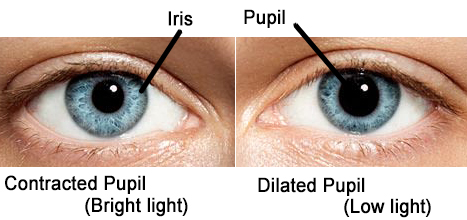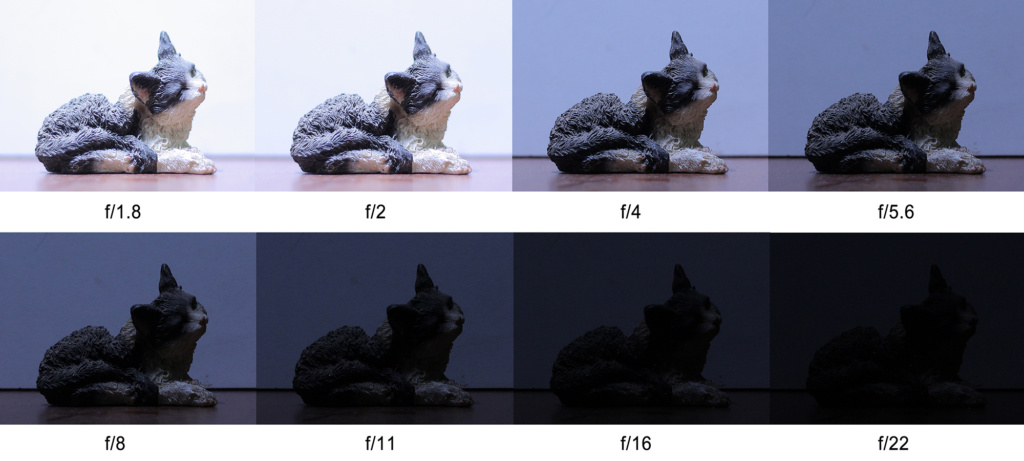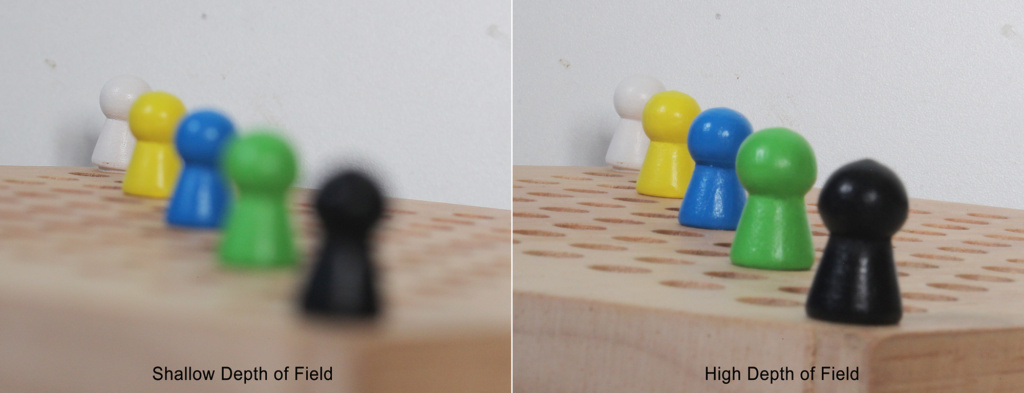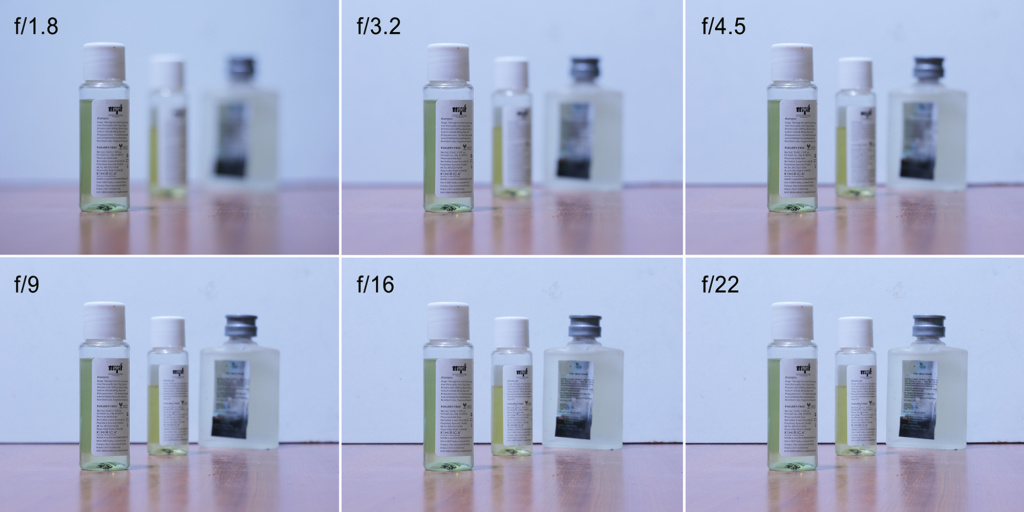You enter a room from bright sunny outdoors. The room looks dark, and it takes some time to get used to the less light inside. You get up in the middle of the night to drink water. Even with no lights on, it is not difficult to move around the room. This is because the eyes have got used to the darkness.

This experience is due to the change in the amount of light entering the eyes. This amount is controlled by the iris, a muscular diaphragm behind the cornea in the eye. The iris contracts or increases in size depending on the light present. This makes the hole in the middle of the iris bigger or smaller. This hole is called the pupil of the eye. When light entering the eye is less, the iris contracts making the pupil bigger, and allowing more light to enter. Similarly, for bright light, the pupil becomes smaller to allow less light in.
The camera has a diaphragm for the iris, and the aperture is its pupil. Simply put, aperture is the hole that lets in light when shutter is open and allows light to fall on the film/sensor. Aperture is one of the pillars of the Exposure Triangle, the other two being ISO and Shutter Speed.
F-stop or F-number
Aperture is measured using f-stop or f-number. The numbers on the f-stop scale are: f/1.4, f/2, f/2.8, f/4, f/5.6, f/8, f/11, f/16, f/22. Some cameras have numbering as f1.4, f2, f2.8 and so on. These numbers depend on the lens and its focal length. Based on the settings, the numbers in between can change.
Smaller the f-stop value, bigger is the aperture. This is because f-stop is a ratio. F-number is the ratio of focal length of the lens to the aperture diameter.
Aperture diameter = focal length of lens/f-stop
For each jump in f-number to its right, the aperture reduces by half. f/1.4 has the largest aperture while f/22 has the smallest aperture.

How does aperture affect the image?
There are two ways in which an image is affected by the change in aperture: Brightness and Depth of Field (DOF).
Low f-stop -> Large aperture -> More bright, low DOF
High f-stop -> Small aperture -> Less light, high DOF
Brightness
Lower f-stop increases the aperture diameter, letting in more light. As f-stop number is increased, the amount of light entering the aperture reduces.

Depth of Field (DOF)
Depth of Field, or DOF is the amount of image that is sharply focussed. A low or shallow DOF means only a particular part of the image is sharp, and the rest of the image is blurred. We see such DOF in portrait images. A high DOF has everything sharp and in focus. Landscape images have high DOF.

In the first image above, the f-stop is set to the smallest value. The lens is focussed on the white peg making it sharp. The rest of the pegs appear blurred. The lens can be made to focus on any of the items in the image. Only those will be sharp, and the rest of the image will be blurred and out of focus.
The second image is set to a high f-stop. This aperture value brings everything in the image into focus, and sharp. While shooting landscapes, a high f-stop is recommended.

In this combo image, the f-stop is varied, starting from the lowest for that lens (50 mm focal length) to the maximum f-stop possible for this lens, i.e., from 1.8 to 22. The extent of sharpness (focus) increases from the first bottle to all the three bottles as the f-number increases.
The brightness is maintained constant by changing the shutter speed. The ISO is kept constant at 100 for all the six images.
As a ready reckoner, low f-stop is used for portraits and objects at close distance. The focus will be completely on the object blurring out the rest of the image.
High f-stop is selected for landscapes when the entire image needs to be sharp and visible clearly.


Please let me know if you’re looking for a article author for your blog. You have some really great posts and I think I would be a good asset. If you ever want to take some of the load off, I’d really like to write some material for your blog in exchange for a link back to mine. Please blast me an e-mail if interested. Many thanks!
Thank you for goin through my blogs and writing to me. Will definitely get back to you later. If we collaborate, it will be great. Will decide and get back to you.
certainly like your website however you need to check the spelling on several of your posts. Several of them are rife with spelling issues and I to find it very troublesome to inform the truth then again I抣l certainly come back again.
Thank you for pointing out. Will check all pages and correct them.
I got this site from my buddy who shared with me about this website and now
this time I am visiting this web site and reading very informative articles at this time.
Hi to all, the contents present at this web page are genuinely remarkable for people experience,
well, keep up the nice work fellows.
Hey I know this is off topic but I was wondering if
you knew of any widgets I could add to my blog that automatically tweet my newest twitter updates.
I’ve been looking for a plug-in like this for quite some time and was
hoping maybe you would have some experience with something like this.
Please let me know if you run into anything. I truly enjoy
reading your blog and I look forward to your new updates.
I every time emailed this website post page to all
my contacts, for the reason that if like to read it after that my contacts will too.
I was looking at some of your posts on this internet site and I think this site is really informative! Continue posting.
Good writeup about aperture. Please write more articles about camera functions.
It’s a pity you don’t have a donate button! I’d certainly donate to this superb blog! I guess for now i’ll settle for bookmarking and adding your RSS feed to my Google account. I look forward to brand new updates and will share this blog with my Facebook group. Talk soon!
Thanks for another informative blog. Where else could I get that type of info written in such a perfect way? I have a project that I’m just now working on, and I have been on the look out for such information.
Hello! This is my first visit to your blog! We are a group of volunteers and starting a new project in a community in the same niche. Your blog provided us beneficial information to work on. You have done a marvellous job!
Good article about aperture. The comparison with eye is well written
This is very attention-grabbing, You’re an excessively professional blogger. I’ve joined your feed and look ahead to searching for more of your wonderful post. Additionally, I’ve shared your website in my social networks!
Did not know the comparison between camera aperture and eye. Simple to understand
Pingback: WN
Easy information about cameras
Easy to understand
Simple explanation about aperture
Cool
I was curious if you ever considered changing the layout of your blog? Its very well written; I love what youve got to say. But maybe you could a little more in the way of content so people could connect with it better. Youve got an awful lot of text for only having 1 or 2 pictures. Maybe you could space it out better?
I have been exploring for a bit for any high-quality articles or blog posts on this sort of area . Exploring in Yahoo I at last stumbled upon this website. Reading this info So i’m happy to convey that I’ve an incredibly good uncanny feeling I discovered just what I needed. I most certainly will make sure to don’t forget this web site and give it a look on a constant basis.
All essays very easy to understand. Write more.
Good